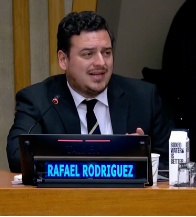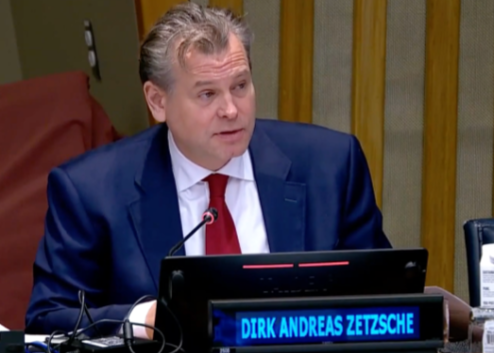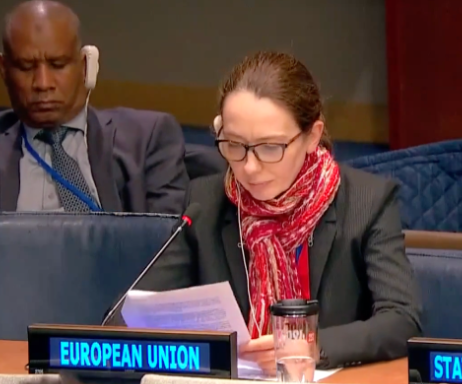CSocD61: Addressing Inequalities in the Labour Market and Accelerating Recovery After the Covid-19 Pandemic
61st Session of the Commission for Social Development
6 February - 15 February 2023
3rd Plenary Meeting
6 February 2023

By Kiyana Newell / GICJ
Executive Summary
From February the 6th through to February the 25th 2023 the 61st session of the United Nations Commission for Social Development (CSocD61) took place in New York City, United States. . The session’s main discussion with members consisted of 1) creating productive employment for all as a way of overcoming inequality in the labour market after the Covid-19 pandemic and 2) full implementation of the 2030 Agenda for Sustainable Development.
This report will focus on the 3rd Plenary Meeting of the 61st Session. Within this session, the panel discussed issues relating to the priority theme in the form of presentations to reflect policy work completed thus far to ensure productive employment and full implementation of the 2030 Agenda for Sustainable Development were being addressed. For this session the priority theme was:
Item - 3(a) Discussion on the priority theme: Overcoming inequalities by creating productive employment for all post Covid-19 and the implementation of the 2030 Agenda for Sustainable Development
Following from this, an interactive dialogue took place where member states could voice concerns and ask questions, following from which the high-Level panel had time to address these concerns.
The committee discussed issues such as the digitisation of the economic market to increase financial inclusivity presented by Dr. Dirk Andreas Zetzsche and Mr. Rafael Rodriguez presented on ways in which Guatemala was resilient during the Covid-19 pandemic. During interactive dialogue, the role of formalisation regarding the progression of the economic market and the role of education policy to boost equality in the labour market was raised.
Geneva International Centre for Justice (GICJ) commends the members of the CSocD on their strong commitment to enhancing social protection and development post-Covid-19 and now during the war in Ukraine. However, despite efforts made, we note with concern that much is still to be done to overcome the issues preventing the full right to social development. Therefore, the GICJ calls upon members to fully address inequalities preventing inclusion in the labour market as well as promote social development as a human right.
Background
The Commission for Social Development previously known as the Social Commission, was created in 1946 by the Economic and Social Council (ECOSOC) pursuant to res.10 (II). The goal of the Commission for Social Development was established to advise the ECOSOC on social policies. Since 2006, according to the Copenhagen Declaration of Social Development of 1995, the CSocD has committed itself to social development items. Currently, the Commission consists of 46 members elected by ECOSOC and serve four-year terms. The CSocD meets annually at the United Nations Headquarters in New York City.
The Covid-19 pandemic resulted in brutal shocks to the economy, affecting jobs, education, and people’s livelihoods globally. The pandemic also exposed worsening inequalities regarding social and economic well-being, where marginalised groups were most afflicted. The report submitted following the ECOSOC decision 2022/327 illustrates how overcoming inequality is a salient goal of the 2030 Agenda for Sustainable Development. The report clarified that inequality does not have to be impending if overcome by policies targeting productive employment. Productive employment could increase income for marginalised persons, thus gaining access to opportunities and increased well-being.
Presentations
Chair-Person, H.E. Alya Ahmed Saif Al-Thani, called the meeting to order and introduced the 3rd Plenary Meeting by stating the principles of the 61st session, which included the discussion on the priority theme. The floor was then given to the Keynote speaker, Ms. Manuela Tomie, Director of International Labour Organisations Conditions of Work and Employment Programme, who emphasised that inequalities in the labour market can be addressed by social dialogue and creating jobs, equal access to education and training as well as equality policy-making, protecting workers from work-related deaths, injuries and diseases, the transition of workers from the informal market to the formal economy, the establishment of social protection, and fair trade and shared prosperity.
 Rafael Rodriguez, Minister of Labour and Social Welfare, presented how Guatemala has recovered from the pandemic. Noting that, the country was resilient to other Latin American countries comparatively with only a drop of 1.8 in GDP and saw an “8 percent and then 4 per cent in 2022”. Mr. Rodrieguez commended Guatemala’s resiliency and emphasised it was due to its political and policy willingness.
Rafael Rodriguez, Minister of Labour and Social Welfare, presented how Guatemala has recovered from the pandemic. Noting that, the country was resilient to other Latin American countries comparatively with only a drop of 1.8 in GDP and saw an “8 percent and then 4 per cent in 2022”. Mr. Rodrieguez commended Guatemala’s resiliency and emphasised it was due to its political and policy willingness.
Two social programs were established to circumvent the impact of Covid-19 in their country. First, within three months, family payments were given to millions of families. This was a challenge because 70 percent of the economy was still in the informal sector, meaning that though these parts of the economy held value they were not formally registered. Therefore, as they are not formally registered it makes it difficult to distribute the aid of family payments to those who need it most as they slip under the radar.
Second, Guatemala established the Fund for the Protection of Employment, which allowed Guatemala to address the suspension of labour contracts. The employer was responsible for registering for this program, so the employees were not burdened to register but received aid, nonetheless. In addition, labour employers stressed the need to maintain relationships with their employees during the Covid-19 pandemic, which allowed employees to gain expedited access to those funds. Through this, a certain amount of businesses in the informal sector were brought to the formal sector, which increased the contribution to social security in the country.
Dr. Dirk Andreas Zertzsche, Professor of Financial Law at the University of Luxemburg, thanked the Commission for the opportunity to speak in front of a distinguished audience. Dr. Zertzsche deemed that the vulnerable are exposed during a crisis for three reasons: income is under-diversified, lower education, and vulnerable groups usually have less influence in overall economic and social governance. In addition, in the lens of Covid-19, Dr. Zertzsche highlighted that it exposed the vulnerable, undermined years of efforts in sustainable development, and forced people to digitise.
Commission for the opportunity to speak in front of a distinguished audience. Dr. Zertzsche deemed that the vulnerable are exposed during a crisis for three reasons: income is under-diversified, lower education, and vulnerable groups usually have less influence in overall economic and social governance. In addition, in the lens of Covid-19, Dr. Zertzsche highlighted that it exposed the vulnerable, undermined years of efforts in sustainable development, and forced people to digitise.
Dr. Zertzsche believes that policy regarding digitisation can bring people from the informal economic sector to the formal economic sector. Close to 2 billion people globally are within the informal sector. However, due to the informality of businesses, “G2P” or “government-to-people” payments could not be paid out and therefore did not soften the financial impact of Covid-19.
Dr. Zertzsche expressed that financial exclusion was the culprit of this problem and expressed that financial inclusion deserves more attention. In order to reach financial inclusion, the professor laid out a policy framework for “digital financial transformation”. This would connect the digitisation of businesses to the increase of economic inclusivity by training the vulnerable and creating a business identity that Dr. Zertzsche believes is at the core of financial inclusion.
Interactive Dialogue
 The Representative of the European Union asked two questions: 1) What is the role of formalisation of employment with respect to human rights labour standards? and 2) how can educational policy be mobilised concerning vocational training, so young people can overcome hardships in gaining access to initial employment?
The Representative of the European Union asked two questions: 1) What is the role of formalisation of employment with respect to human rights labour standards? and 2) how can educational policy be mobilised concerning vocational training, so young people can overcome hardships in gaining access to initial employment?
Ms. Manuela Tomei replied that workers in the informal labour market are outside of labour law, social security, or social protection coverage. She referred back to the case of Guatemala during the Covid-19 pandemic because those who were disproportionately impacted were those also inside the informal labour market. She also mentioned that the government of Guatemala did not want to penalise those not within the formal market, so creating social protection through cash transfers was fitting. Addressing education policy, Ms. Manuela Tomei expressed that measures need to specifically target the transition of youth to employment by having a relationship between the schools and the world of production to provide skills to the youth that are in demand by the world of production.
“There will be no inclusion without development” quoted by Mr. Julio Demartini, Minister of Social Development and Social Inclusion of Peru. He began by addressing how states should approach social issues. Mr. Demartini explained that limits to social development can only be overcome if the entirety of a government is in solidarity.
The Representative of Zimbabwe confronted how Covid-19 exacerbated the inequalities towards people with disabilities and took a step backwards in providing persons with disabilities with education. The representative wanted to know how people should proceed forward when certain persons could not benefit from virtual learning and some social assistance provided does not graduate persons with disabilities from poverty. Additionally, he asked what concrete measures could be taken for older persons that depend on not-so-reliable social security.
Further, Ms. Manuela Tomie addressed the concern from the Representative of Peru first. She mentioned that the representative was correct in highlighting the importance of the all-of-government approach to policy action and was right in asking what the point is in education for all if people do not accept everyone into the labour market. Responding to Zimbabwe, Ms. Manuela Tomie conveyed that no single measure will address the problem of incorporating persons with disability into the labour market or society in general. Universal access to education for children with disabilities, especially in early childhood education, is critical, as well as policies that take into consideration the different circumstances of persons with disabilities to provide adequate support.
Position of Geneva International Centre for Justice
Geneva International Centre for Justice (GICJ) welcomes the efforts made and the overall commitments achieved by members of the CSocD with respect to the right to social development. We also recognise mechanisms presented by the high panel, such as policy frameworks to ensure financial inclusion and job production. However, notwithstanding the policies made to fast-track progress after Covid-19, marginalised persons are still under threat of being excluded from the labour market. Therefore, we call on member states to address education policies to warrant access to education for all, including but not limited to persons with disabilities and youth entering the labour market. Additionally, we call on member states to promote and adopt policies that expand decent work opportunities for all.
CSocD, Commission for Social Development,Social Development, The Right To Development, human rights Geneva, justice, geneva4justice, GICJ, Geneva International Centre for Justice












